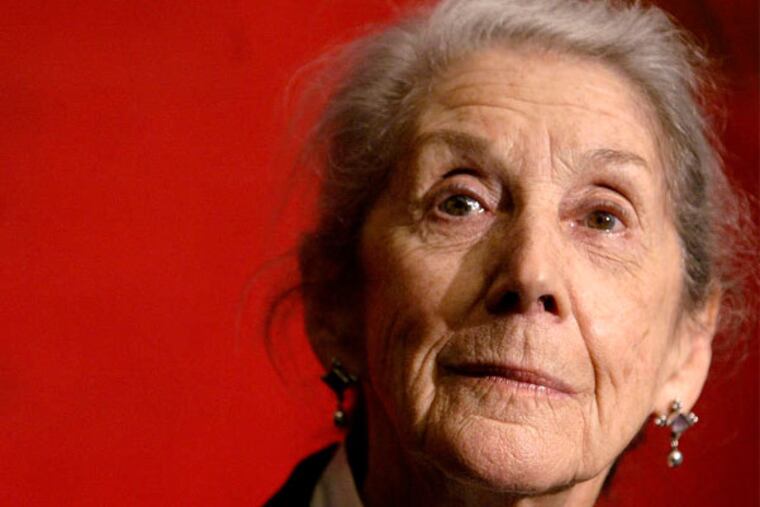Nadine Gordimer, 90, acclaimed South African novelist
Nadine Gordimer, 90, who won, among many prizes, the 1991 Nobel Prize in literature, died Sunday at her home in Johannesburg, South Africa. The cause of death had not been released as of late Monday.

Nadine Gordimer, 90, who won, among many prizes, the 1991 Nobel Prize in literature, died Sunday at her home in Johannesburg, South Africa. The cause of death had not been released as of late Monday.
Ms. Gordimer was most famous for her novels, several of which were written at the height of the apartheid era in her native land. Her writing is widely credited with evoking the conscience of a generation. In novels such as The Conservationist (1974), Burger's Daughter (1979), and July's People (1981), she invented characters and tales that exemplify, interrogate, and warn against hatred among the races, and illustrate the inhuman power of the fascist state.
Three of her novels were banned by the South African government for some time, though Ms. Gordimer herself was never persecuted or jailed for her outspoken criticism.
Ms. Gordimer was born in the small gold-mining town of Springs, near Johannesburg. Her mother had come to Africa from England at age 6, and her father was a watchmaker and jeweler from Lithuania. Ms. Gordimer began writing and publishing in her late teens. She attended the University of the Witwatersrand, and she later said it was there, "through mixing with other people who were writing or painting, that I got to know black people as equals."
She made Johannesburg her permanent home in 1948, publishing her first book of fiction, Face to Face, the next year. Her first published story in the New Yorker, in 1951, began a long relationship with the publication that helped bring her work to a wider audience, including the autobiographical essay "A South African Childhood" in 1954. In 1960, the arrest of her friend Bettie du Toit permanently radicalized Ms. Gordimer, and from then on, she was a vocal antiapartheid activist, joining (with some reservations) the African National Congress.
Her plots were thick and often many-stranded. She studiously avoided the too-easy moral, the one-dimensional villain or hero. Thomas Lask, reviewing A Guest of Honour in 1970 for the New York Times, wrote that "there is something Olympian, something magnificently confident, in the way in which this South African writer goes about her work." Her writing could also be sensuous and even poetic, surprising traits for a novelist seen as political.
Yet it is a mistake to see Ms. Gordimer as primarily a political or moralistic writer. She told the Paris Review that "the real influence of politics on my writing is the influence of politics on people." As titanic as their tapestries sometimes were, her novels had broader aims than the fate of Africa or its races. They are human tales - existential depictions of lives in passionate, threatening circumstances. Her books were bigger than their themes.
In The Conservationist, Mehring, a rich white landowner, thinks he is an enlightened, benevolent, central figure in a world in which he is really a bigoted, benighted, oppressive outsider. His self-misunderstanding is tragic.
In July's People, a white family flees racial violence and hides out in the house of its servant, July, who suffers the anxiety and mixed allegiances of one who hides hunted guests. The Pickup (2001) is a reversal, concerning an undocumented Arab man and a white woman; when he is deported to his homeland, she finds out what it is like to be the outsider.
One of Ms. Gordimer's most acclaimed novels is Burger's Daughter. Rosa Berger faces the legacy of her antiapartheid crusader father - and discovers the necessity to be committed to something in life. Rosa is a flesh and blood character, not always admirable, but always depicted with knowing sympathy and frequent sensuousness.
At the Nobel ceremony in 1991, Ms. Gordimer spoke of "the artist's rebellious integrity," a trait this self-described radical worked long and hard to preserve.
She still had 21 more years of writing ahead of her. Some critics would say she lost her main theme - apartheid - while others applauded her later studies of immigration, social justice, the African HIV epidemic, and the brutal throes of transition from fascism to democracy.
"What a writer does," she told the Paris Review, "is to try to make sense of life. . . . It's seeking that thread of order and logic in the disorder, and the incredible waste and marvelous profligate character of life."
Ms. Gordimer was married twice. Her second husband, the art dealer Reinhold Cassirer, died in 2001. Her immediate survivors are daughter Oriane, from her first marriage; and Hugo, a son from her second.